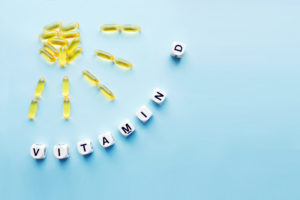Vitamin D and Me
I’ve had back pain off and on since I was a third grader. I also love books. What do these two things have to do with each other? They are actually super related for me. I had a ton of hardback books that I used to keep on the floor next to my bed, and would often spend hours each night reading them. One night, I went running and dove into my bed, and proceeded to fall right off the other side, landing on my back on top of all my hardback books. I couldn’t move. My parents came and assessed the situation and helped me into bed. The next day I went to the doctor who diagnosed me with having a sprained tailbone. Yes, I was that third grader who had to sit on padded seats or carry around a donut for a few weeks.
Since that time, back pain has plagued me here and there. I’ve done stretches, I’ve taken a break from running, I’ve passed out from the pain, and I’ve changed my shoes. All of these things would provide temporary relief, but the back pain would always come back. Over the years, as I’ve trained for marathons, my back pain would increase. Up the mileage, up the pain. Medical advice that I was given by my old doctor was “well, I don’t want to tell you to stop running, so you just might have to get used to the pain.” Hmm… not sure about that.

This past year, I switched to a different doctor and was referred to an endocrinologist for other medical issues. According to WebMD, endocrinologists specialize in glands and hormones.1 Bones and bone health are not necessarily their thing. At my first visit, she did a baseline blood test which indicated that my Vitamin D level was low, amongst other things. The Vitamin D was kind of an afterthought, as that wasn’t the reason for my visit. She told me to take supplements, which I brushed off. I’m the type of person where if you don’t tell me exactly what to buy and take, I get overwhelmed with options and then just sort of shut down and don’t do anything.
At my next visit, my bloodwork looked good, but my Vitamin D level was still low. At the time, I was training for a marathon and was under the false impression that being outside in the sun will give you all the Vitamin D you really need. She realized I wasn’t going to do anything about it, so she prescribed me prescription strength Vitamin D (yes, that really does exist). It worked though, because all I had to do was go into the pharmacy and pick up my order, no options involved. After taking strong Vitamin D for a month, I was switched to the over the counter kind that Costco sells in big bottles (she had told me exactly what to get, thus making the likelihood that I followed through much higher, and my mother made it easy on me and had it shipped directly to my door).
As soon as I had taken the Vitamin D for about one to two weeks, I felt a change. I had never told my endocrinologist about my back pain, but I suddenly had minimal to no back pain. I was increasing my mileage for my marathon training, and still felt fine.
When I went back to my endocrinologist for my next visit, she told me that my bloodwork indicated that my Vitamin D level was nearly normal. It was still on the slightly low side, but no longer in the danger zone. I told her about how my back pain had pretty much been eliminated. She then told me something no other doctor had ever mentioned: Vitamin D helps bone health.2
I’m sure we’ve all heard the commercials, the marketing, the print materials that say “milk, it does a body good.” We’ve grown up knowing that calcium comes from milk, which helps build strong bones. But what my endocrinologist told me is that for some people, without enough Vitamin D to absorb that calcium, it can lead to poor bone health. Vitamin D is just as important as calcium. And you don’t just get it from the sun.
My takeaway from this experience is that you may feel fine, or you may feel like things just change when you get older. I didn’t necessarily feel bad; I just had some back pain now and then. Sometimes symptoms are indicators of other problems, and without the full picture, it can be hard to know what to do. Talk with your doctor at your medical visits. Listen to what they suggest, and weigh your options. I felt “fine” before, but after following the recommended path of treatment by my endocrinologist, I feel much, much better.
1 https://www.webmd.com/diabetes/what-is-endocrinologist#1
2 https://orthoinfo.aaos.org/en/staying-healthy/vitamin-d-for-good-bone-health/